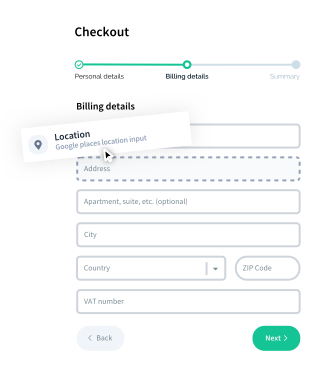Plugins
Learn how to extend Vueform with plugins.
Examples
Check out our official plugins for inspiration:
- https://github.com/vueform/plugin-mask
- https://github.com/vueform/vueform-plugin-toggle-confirm
- https://github.com/vueform/vueform-plugin-toggle-tooltip
Registering Plugins
Plugins can be applied in vueform.config.js:
// vueform.config.js
import { defineConfig } from '@vueform/vueform'
import vueformPlugin from '@vueform/vueform-plugin'
export default defineConfig({
plugins: [
vueformPlugin,
],
// ...
})Plugin Options
A plugin must be a function that returns an object with the plugin options.
export default function myPlugin() {
return {
// ... plugin options
}
}apply
- Type:
string|regex|array - Default:
undefined
Which components in Vueform this plugin's setup option should be applied to.
export default function myPlugin() {
return {
apply: /^[a-zA-Z]+Element$/,
setup(props, context, component) { /* ... */ },
}
}It can be an exact component name as a string:
apply: 'TextElement',Multiple component names as an array:
apply: ['TextElement', 'TextareaElement'],A regex, eg. which applies to each element:
apply: /^[a-zA-Z]+Element$/,Or an array of regex:
apply: [/^[a-zA-Z]+Element/, /^Element[a-zA-Z]+$/],If left empty and the plugin contains a setup option it will be applied to each component. Component names can be found at Components page.
setup
- Type:
function - Arguments:
{object} props- the Composition API'spropsobject{object} context- the Composition API'scontextobject{object} component- the component's exported properties and methods
- Returns:
object- component properties and methods
Extends the component's properties and methods.
import { ref } from 'vue'
export default function myPlugin() {
return {
apply: 'TextElement',
setup(props, context, component) {
const myRef = ref('Hello World')
The component argument is an object containing all the component's properties and methods. Properties are either ref or computed objects so .value is required to access / modify their values.
Component properties and methods can be found at Components page.
props
- Type:
object - Default:
{}
Extends the component's prop list.
export default function myPlugin() {
return {
apply: 'TextElement',
props: {
format: {
type: String,
required: false,
}
}
}
}config
- Type:
function - Arguments:
{object} config- the default Vueform config object
- Returns:
void
Modifies the default configuration. Executed before project level config is applied.
import myPreset from 'my-preset'
export default function myPlugin() {
return {
config(config) {
// Adds a new config value
config.foo = 'bar'
install
- Type:
function - Arguments:
{object} app- the Vue.js app instance{object} $vueform- the global $vueform object
- Returns:
void
Executed after configuration object is resolved, before registering components and setting global $vueform object. Only use this, if you know what you are doing.
export default function myPlugin() {
return {
install(app, $vueform) {
// Adding new variable to global $vueform object
$vueform.foo = 'bar'
}
}
}

